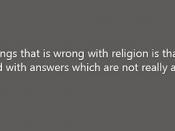"It is important to have new experiences of the other," explains Wesley, "and this does not come unless you meet. Through interfaith dialogue, you can overcome prejudices, and come to know others as believing, praying people with a spiritual history. It can help us find a new context in which to speak about our relationships. It is a time for each religious tradition to relearn their faith in the context of religious plurality. And through this process, in reinterpreting one's own beliefs, faith becomes stronger and clearer."
Thus, the goals of interfaith dialogue are "to promote better understanding, to create a community of communities, and to create a community of conversations." He identifies three different types of issues in interfaith dialogue: relations, social and pastoral concerns, and the possibility of corporate service and action.
Relations issues cover activities and discussions to promote harmony, cooperation, and work for the common good.
Social issues include the role of religion in public life. The use of religion for political aims complicates the process. Under Islamic Sharia law for example, what are the rights of minorities? Conversely, what are the rights of Islamic minorities in Sweden and France etc. to practice their religion?
Pastoral issues include the different religious laws governing marriage, divorce, and children. How does a pastor deal with a congregation member married to someone of another religion? Interreligious prayer and worship is another category. Can a Christian attend a church service on Sunday and a Buddhist meditation on Wednesday? What are the guidelines? There can be a spiritual crisis as some Christians are attracted to Eastern spiritual faiths--some are living in two faiths.


